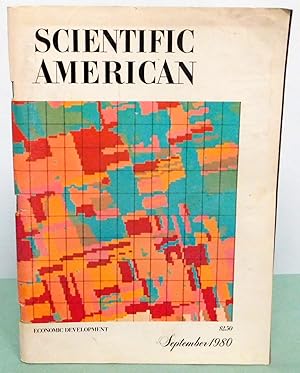k k s dadzie halfdan mahler nevin (1 résultats)
Type d'article
- Tous les types d'articles
- Livres
- Magazines & Périodiques (1)
- Bandes dessinées
- Partitions de musique
- Art, Affiches et Gravures
- Photographies
- Cartes
-
Manuscrits &
Papiers anciens
Etat
- Tous
- Neuf
- Ancien ou d'occasion
Reliure
- Toutes
- Couverture rigide
- Couverture souple
Particularités
- Edition originale
- Signé
- Jaquette
- Avec images
- Sans impression à la demande
Pays
Evaluation du vendeur
-
Scientific American September 1980 Volume 243 Number 3
Edité par Scientific American, Inc., New York, NY, 1980
Vendeur : Argyl Houser, Bookseller, Turlock, CA, Etats-Unis
Magazine / Périodique
Soft cover. Etat : Good. Etat de la jaquette : No Jacket As Issued. All pages are present (I checked). All pages are toned (age tanned) around the perimeter. Some pages are dog-eared or have a bent corner tip. A few spots of foxing (tan spotting) on the last few of pages only. Front and back covers are lightly soiled, wrinkled, rubbed, with some water stains visible along edges of the front cover. These stains did not soak through to the pages themselves. There are also some creases and stress lines near edges of covers -- particularly the back cover. So this is a worn copy but complete with mostly clean pages. It will be bubble-wrapped and carefully packed in a sturdy box to ensure safe transit. This issue focuses on economic development and includes the following: "Economic Development: An issue on the subject as the developing nations press for a new international economic order" by K.K.S. Dadzie; "People: The fundamental purpose of economic development is to improve the well-being of human beings" by Halfdan Mahler; "Food: Feeding everyone adequately calls for heavy capital investment and fairer income distribution" by Nevin S. Scrimshaw and Lance Taylor; "Water: Enough of it for agriculture, industry and people demands human intervention in the water cycle" by Robert P. Ambroggi; "Energy: Future growth in worldwide demand for energy will come mainly from developing countries" by Wolfgang Sassin; "The Economic Development of China: In this developing country a fourth of mankind appears secure against famine and epidemic" by Ding Chen; "The Ecomonic Development of India: It has made significant gains in industry and agriculture, but the growth of the economy is slow" by Raj Krishna; "The Economic Development of Tanzania: A poor nation sets out to industrialize" by Robert B. Mabele, William M. Lyakurwa, Beno J. Ndulu and Samuel M. Wangwe; "The Economic Development of Mexico: The country shows substantial development, but most of its population remains impoverished" by Pablo Gonzalez Casanova; "The World Economy of the Year 2000: An input-output model shows how it might be possible to narrow the gap between rich and poor" by Wassily W. Leontief" plus Letters; 50 and 100 Years Ago; The Authors; Mathematical Games; Books; Science and the Citizen; The Amateur Scientist; and Bibliography.


